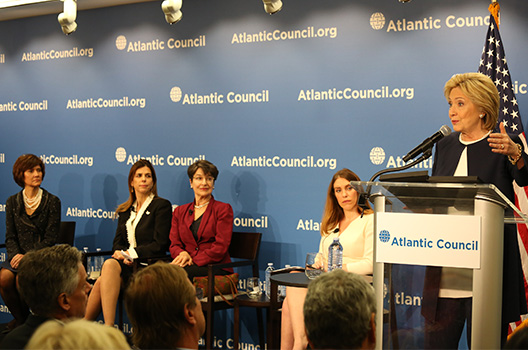 At a time when women’s participation in government is increasing throughout Latin America, former Secretary of State Hillary Rodham Clinton joined the Atlantic Council’s Adrienne Arsht Latin America Center and fellow influencers in the region for the launch of the Women’s Leadership in Latin America Initiative. Led by Ambassador-in-Residence Capricia Penavic Marshall, the event featured a panel of female leaders from Mexico, Costa Rica, and Colombia.
At a time when women’s participation in government is increasing throughout Latin America, former Secretary of State Hillary Rodham Clinton joined the Atlantic Council’s Adrienne Arsht Latin America Center and fellow influencers in the region for the launch of the Women’s Leadership in Latin America Initiative. Led by Ambassador-in-Residence Capricia Penavic Marshall, the event featured a panel of female leaders from Mexico, Costa Rica, and Colombia.
Following opening comments by Governor Jon M. Huntsman, Jr., in which he remarked on the Center’s role in promoting constructive leadership and engagement in US-Latin America relations, the Director of the Adrienne Arsht Latin America Center, Peter Schechter, introduced Secretary Clinton.
Secretary Clinton praised Latin American countries for successfully electing women Presidents, reaffirming that Latin America is a region in transformation. She noted that over the course of nearly twenty years, the percentage of women legislators has nearly doubled, girls are surpassing male classmates in education enrollment, and voters have elected women leaders in Brazil, Panama, Nicaragua, and Argentina, among other nations. Moreover, she emphasized the role women have played in advancing human rights – many are visibly advocating for change in Venezuela and Cuba – and in leading transformations at all levels of government.
Despite advances, Secretary Clinton voiced the need to raise incomes and end poverty, to eliminate gender-based violence, to strengthen reproductive rights, and to assure women are receiving equal pay. She acknowledged that women of indigenous and African-descent trail in indicators in many countries, and that closing these gaps is imperative for fulfilling the promise of democratic and economic opportunity.
“When women and girls participate, economies grow and nations prosper,” Clinton said. “Advancing the full participation of girls and women is not just the right thing to do, it is the smart thing as well.”
Recognizing that the interdependence between the United States and Latin America should be further embraced, Secretary Clinton acknowledged that closer ties will help the US economy and strengthen America’s leadership in the world.
“I believe firmly that no region in the world, no region, is more important to our long-term prosperity and security than Latin America. No region is better positioned to emerge as a new force for global peace and progress,” Secretary Clinton stated.
Clinton also expressed her outrage on behalf of the people of Venezuela. Having faced threats, jailing, and assassinations over the past few months, Clinton reaffirmed that the will of Venezuelans must be respected and upheld by the Maduro administration in the upcoming elections.
Looking toward the future of US-Latin America collaboration, Clinton recognized opportunities for the United States to further demonstrate leadership in the region. The former Secretary of State concluded with a story highlighting women entrepreneurs.
“It is not just about women’s lives, women’s rights, and women’s opportunities,” Secretary Clinton affirmed. “It is about lifting up families, communities, and countries, and providing greater opportunities for everyone. That should be our hallmark and our clarion call, and I will do whatever I can to support those of you who are on the front lines making change happen for women.”
Moderated by The Honorable Capricia Marshall, the three panelists kicked off the discussion by sharing their personal incentives for joining government and public service. Senator Ninfa Salinas, a member of the Partido Verde Ecologista de México, recognized that her inspiration for joining public service stemmed from a gap between citizens and politicians in Mexico, which can lead voters to become disconnected from the political process.
“This breach is because people feel very disappointed about government policies and people in government in general. What happened sooner or later was that people fell back into their comfortable positions…They just simply detached themselves of the responsibility to be there, to have a voice, and to create their own reality. So I felt that was my biggest motivation,” she noted.
As a student, Maria Isabel Nieto Jaramillo, Consul General of Colombia in New York, first participated in politics after becoming involved with the Movimiento de la Séptima Papeleta, a student-led movement that drove Colombia toward a new constitution in the late 1980s.
“There were a series of events that shocked the generation of students [in Colombia],” she pointed out. “I didn’t look for politics; politics found me in the right moment…My grandmother was the first woman that participated in a political campaign in Colombia.”
Having been raised in a politically inclined family, Muni Figueres, former Ambassador of Costa Rica to the United States, knew she would enter public service. Working in her family’s company, she became involved in the public sector through a new export initiative that matched her biculturalism with a new, diversified exporting and investments effort with the United States.
Having discussed their experiences within politics and the public sector, the panelists concluded by discussing the political quotas implemented in various Latin American countries. Former Ambassador Figueres touched on the differing obstacles that exist between classes in many countries.
“The obstacles women face in politics vary a great deal according to their background, according to the resources that are available to their families. It has to be said that the lower income group a woman belongs to the harder her fight will be going up. It is true here and it is true in our countries, and all over the world. Maybe what we have to work on is crafting politics and mechanisms that will especially concentrate on women in lower income families, to raise their standard of living, because through osmosis they will participate in politics,” former Ambassador Figueres affirmed.
